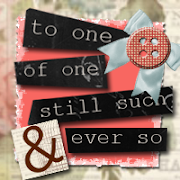My reading hasn't progressed that much. And though I find a strong desire in my heart to discuss Mr. Myriel in Character Thursday, I won't, at least until I have finished the first volume of
Les Miserables, and thus have more complete view on the person.
However, there are many still from the books I have finished that deserve attention for their roles in the story, or from their extraordinary characters. This week I choose a woman. I rarely choose a woman for my Character Thursday, because being a woman, men seem to be far more curious and interesting. I wrote about Haidee, because she was different from most women from the books I read. Eowyn and Arwen number among those I adore, and some Shakesperian females are also steadfast and strong that they little depict most women in their era.
Another woman worth attention is Rebecca from
Ivanhoe. She is first introduced as a fair Jewess, a daughter of Isaac of York, to whom Ivanhoe owed a certain sum for his horse and other necessities as a knight. Being by nature generous, she gave the money back to Ivanhoe, as a token of her gratitude for saving her father.
Then came another deed of kindness. She attended to the wounded Ivanhoe, caring for every wound that would easily kill the man but for her medical skill. She did that even in a strange castle, when she and her travelling companions were kidnapped by the envious and greedy Normans.
As for love, she loved Ivanhoe. So, so dearly she loved him, but he couldn't love her back. How could he? So she didn't burden the young man with many pleadings or tears, but helped him without the slightest hope of reward. Her lover was far more persistent. The Templar kidnapped her, and almost burnt her on stake, for his superiors thought the lady to be a witch. Even in this hour of desperation, Rebecca stood fast for what she believed in. She didn't give her body, nor her heart to the Templar. She didn't renounce her faith to stay alive. She trusted her soul to Providence.
“Be a man, be a Christian! If indeed thy faith recommends that mercy which rather your tongues than your actions pretend, save me from this dreadful death, without seeking a requital which would change thy magnanimity into base barter... Enough, that the power which thou mightest acquire, I will never share; nor hold I so light of country or religious faith, as to esteem him who is willing to barter these ties, and cast away the bonds of the Order of which he is a sworn member, in order to gratify an unruly passion for the daughter of another people. — Put not a price on my deliverance, Sir Knight — sell not a deed of generosity — protect the oppressed for the sake of charity, and not for a selfish advantage...I envy thee not thy faith, which is ever in thy mouth, but never in thy heart nor in thy practice.”
Thus she reproached the Templar for loving her in words and not in deeds. The Templar was hardly a Christian, except by uniform, and the uniform itself brought disgrace to the religion, because many in the same uniform lived on the blood of others.
Rebecca ended her story by living as a woman of charity. She devoted her life to good and merciful deeds, as befits such a great and firm lady.
“Among our people, since the time of Abraham downwards, have been women who have devoted their thoughts to Heaven, and their actions to works of kindness to men, tending the sick, feeding the hungry, and relieving the distressed. Among these will Rebecca be numbered.”
She might be a Jewess, a race so hated by most people in her time. But she proved herself to be a better subject of God's law than those who publicly declared their faith in lips, but not in deeds.
--------------------------------------
-----------------------
Character Thursday
Adalah book blog hop di mana setiap blog memposting tokoh pilihan dalam buku yang sedang atau telah dibaca selama seminggu terakhir (judul atau genre buku bebas).
- Kalian bisa menjelaskan mengapa kalian suka/benci tokoh itu, sekilas kepribadian si tokoh, atau peranannya dalam keseluruhan kisah.
- Jangan lupa mencantumkan juga cover buku yang tokohnya kalian ambil.
- Kalau buku itu sudah difilmkan, kalian juga bisa mencantumkan foto si tokoh dalam film, atau foto aktor/aktris yang kalian anggap cocok dengan kepribadian si tokoh.
Syarat Mengikuti :
1. Follow blog Fanda Classiclit sebagai host, bisa lewat Google Friend Connect (GFC) atau sign up via e-mail (ada di sidebar paling kanan). Dengan follow blog ini, kalian akan selalu tahu setiap kali blog ini mengadakan Character Thursday Blog Hop.
2. Letakkan button Character Thursday Blog Hop di posting kalian atau di sidebar blog, supaya follower kalian juga bisa menemukan blog hop ini. Kodenya bisa diambil di kotak di button.
3. Buat posting dengan menyertakan copy-paste “Character Thursday” dan “Syarat Mengikuti” ke dalam postingmu.
3. Isikan link (URL) posting kalian ke Linky di bawah ini. Cantumkan nama dengan format: Nama blogger @ nama blog, misalnya: Fanda @ Fanda Classiclit.
4. Jangan lupa kunjungi blog-blog peserta lain, dan temukan tokoh-tokoh pilihan mereka. Dengan begini, wawasan kita akan bertambah juga dengan buku-buku baru yang menarik





























